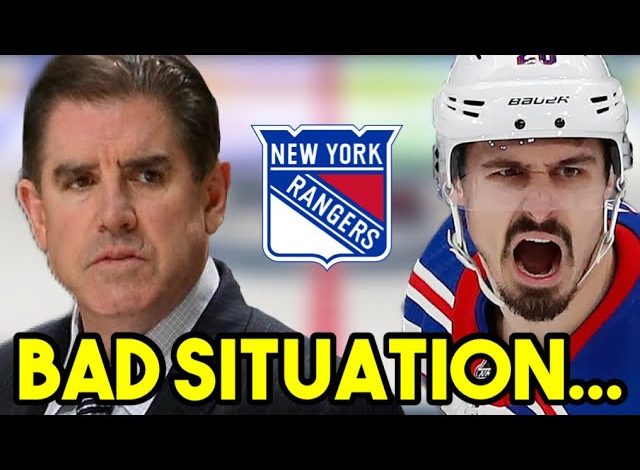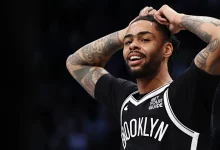Is the New York Rangers’ season salvageable?

As difficult as it is to recall at this very moment of crisis, not too long ago, the New York Rangers appeared to be Stanley Cup contenders, if not the league’s front-runners.
One of those moments occurred last spring when the Rangers were leading Florida 2-1 in the Eastern Conference finals. There was a sense that the 2023–24 team would celebrate the legendary 1993–94 Blueshirts’ 30th anniversary by holding their own Stanley Cup parade in Manhattan. Even though it didn’t work out, New York had advanced to the conference finals twice in three seasons and appeared ready to continue that success in 2024–25 with a squad that wasn’t too old and didn’t lose a lot of players during the offseason.
And early in the season, that appeared to be accurate enough. The Rangers had a good start to the season, peaking in late October at the top of the Elo ratings with a league-high 16 percent chance of winning the championship. Once more, this wasn’t particularly shocking because New York was expected to compete with the other NHL’s best teams. Igor Shesterkin, one of the league’s top goaltenders, was behind this seasoned squad, which had important players who were still in their prime at both ends of the rink.
Up until the middle to end of November, everything appeared to be under cruise control. Then everything changed. New York would lose five straight games beginning on November 21, when the Rangers lost 3-2 to Calgary on the road. After winning two of three games to break the losing streak, they went on to lose five of six games. After an unexpectedly strong victory at Dallas, they lost five of six games again before defeating the awful Blackhawks on Sunday.
If you’re keeping track, the Rangers had lost 16 of their last 21 games going into Sunday’s game, falling from third place in Elo to fifteenth place. This had not only made their Cup odds almost nonexistent, but it had also utterly destroyed their hopes of making the playoffs. On November 21, New York had a 96 percent chance of making the playoffs. On New Year’s Eve, that number dropped to a season-low 27 percent, and on Tuesday morning, it was still only 40 percent.
For coach Peter Laviolette and his team, the losses came amid what seems like years of drama.
In a somewhat uncommon move, New York dealt captain Jacob Trouba to the Ducks on December 6 in exchange for a fourth-round selection and a depth defender. (However, the Rangers had already experienced this when they traded Ryan McDonagh to the Lightning in 2018.) In addition to releasing a slumping player’s contract, the move was intended to jolt the squad out of its initial unsettling slump.
It was unsuccessful.
Days prior to the transaction, the Rangers ranked first in scoring defense and fourth in scoring offensively. They had the greatest penalty kill and sixth-best power play in the league. Currently, they are ranked fourth, 26th, 21st, and 21st in those categories, respectively. (The PK is still operational, yes.)
Shesterkin was later placed on injured reserve, which severely damaged the team’s goaltending and caused Jonathan Quick to decline from his stellar start to the season. Matt Rempe’s shady hit on Miro Heiskanen made him the game’s major antagonist. Additionally, the locker room was more tense than ever before, with trade rumors circulating and Chris Kreider, the team’s once-adored late-blooming scorer, preparing for a move at any moment (before going to IR himself).
How uncommon is this kind of abrupt in-season collapse? Only 38 teams have lost at least 50 points of Elo rating in any 32-game stretch over the first 50 games of a season in seasons with a respectably full schedule1 since 1949–50, as the Rangers have:
However, in many of those instances, poor clubs continued to deteriorate, maybe raising the white flag for an already unimpressive season. (They include and account for the notorious Ottawa Senators of 1992–1993, whose owner got intoxicated and confessed to what would later be called tanking.) It is extremely uncommon to witness this happen to teams that began their slump looking as strong as the Rangers did. Only two clubs in our dataset dropped from a higher position atop the NHL mountain than the 2024–25 Rangers: the 1982–83 Islanders and the 1979–80 Canadiens.
What’s good for New York? Both teams bounced back to qualify for the playoffs. In 1980, the Islanders won the Stanley Cup, but Montreal lost in Round 2 of the playoffs and went undefeated in their final 21 (!) games of the regular season. Every team serves as a reminder that even the finest teams can experience unexpected setbacks, but that gifted teams can also emerge from even the most severe slumps.
Overall, nevertheless, the teams on the aforementioned list found it difficult to regain the rating points they had lost. By the conclusion of the year, 20 out of the 37 pre-2025 teams had recovered some Elo, but about half of those gains were in the single digits. During the rest of the season, 17 out of 37 lost even more Elo than they had already lost during the losing streak that put them on the list. By the end of the season, the 37-team sample as a whole dropped an additional 2.4 points in Elo on average.
Therefore, unless there is a significant change in the style of those former Islanders or Canadiens, the Rangers are most likely currently as follows: A mediocre squad with a number of underperforming, unhappy players (ranked 14th in Elo and 20th in SRS). They still have a 40 percent chance of making the playoffs if they perform well once more, which begins tonight at MSG against the Dallas Stars. The front office in New York must, however, make a number of difficult choices over whether to try to halt the trend and continue to win now or to wager on 2024–2025 and reload for the future.
It goes without saying that nobody anticipated this club would be in that situation only a few months ago.









